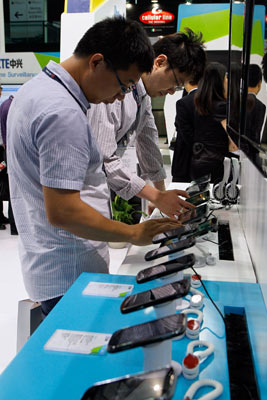Mounting calls for free access to Wi-Fi
Updated: 2012-10-03 09:18
By Eric Jou and Liu Qing (China Daily)
|
|||||||||||
At a recent Wireless China Summit, Figueroa said China has shipped more Wi-Fi capable smartphones than any country in the world. He also said Chinese telecom companies China Mobile, China Unicom and China Telecom have all committed to roll out about 1 million Wi-Fi hotspots across the country.
"We have been interested in investing in China for many years. Some of the progress we have made here is depicted in the Wi-Fi availability around the major cities in China," Figueroa said.
"Today many of the major cities in China have initiatives where they are rolling out Wi-Fi for public access."
 |
|
With more people using their phones to access the Internet, wireless connectivity has become a key issue in cities across China. [Photo by Yong Kai / China Daily] |
According to the Beijing Economic and Information Technology Committee, the whole city will be covered with free high-speed Internet access in about three years and Beijing will build more than 200,000 wireless access points.
Like Beijing, the southern city of Guangzhou also launched public Wi-Fi in 2011. Guangzhou started developing the wireless city concept in 2008, aiming to cover the whole city with wireless technology, both cellular and Wi-Fi.
Wang Qimin, deputy director of the Guangzhou office of the State Information Center, said: "Wireless networks are the city's fifth public utility following water, electricity, gas and transportation."
The vice-mayor of Guangzhou, Gong Erzhen, said in 2011 that the project was designed to make Guangzhou a city with high-speed information technology with complete network coverage across the entire metropolis. As of 2011 Guangzhou offered 41 Wi-Fi hotspots, which are operated by China Mobile.
Earlier this year in Shanghai, China Telecom and the coffee chain Starbucks jointly put out free Wi-Fi hotspots across the city at more than 200 Starbucks locations. On top of that there are another 100 hotspots across Shanghai as part of the i-Shanghai project. Shanghai is expected to become a fully operational wireless city by 2015.
In Shanghai, as in other parts of China, wireless and transportation has become a hot topic. The Shanghai municipal government has been reported to be working on installing wireless access points at bus stops and, soon, buses.
Beijing, Hong Kong, Shanghai and Guangzhou authorities have added wireless devices to bus stops so people can check the status of their bus. Not only will passengers be able to access arrival times, should they happen to be on the bus they may be able to connect to the Internet. Currently in Shanghai more than 200 buses have Wi-Fi connections with more to come in the future.
Zhao Yu, an IT enthusiast in Shanghai, says he's excited to hear about the prospects of having WI-Fi on the bus.
"I take a bus and the subway to work daily," Zhao said. "I have a 3G plan but sometimes the connection isn't that great so, if they do offer Wi-Fi on the bus, it will make my commute more enjoyable."
Of course the ability to access the Internet brings about many risks that scare even the most enthusiastic of online addicts, such as Zhao. Security issues have been rampant with reports over the past few months relating to questionable wireless Internet security.
Many users of mobile Internet access are wary of public-provided hotspots. However, Figueroa says that Wi-Fi access points are among the most secure.
There is a protocol built into most Wi-Fi devices known as Wi-Fi Protected Access 2.
"WPA2 is government-grade level security. It has never been compromised and it is fundamental to every product that we have certified since 2005 so it's quite well protected," Figueroa said.
"Security is just like a seatbelt in your car: It's a method to be safe but you must engage it. We live in the wireless era. Wireless connectivity is really transforming our experience."
Contact the writers at Ericjou@chinadaily.com.cn.
Related Stories
11 areas in Beijing offer free wifi 2012-08-30 20:17
Singapore begins pilot deployments of Super Wi-Fi 2012-09-05 16:45
Wi-Fi firm looks to hotels, universities 2012-08-27 08:04
Telecom carriers to look into mobile Internet 2012-09-11 21:49
Internet industry to stimulate economy: Minister 2012-09-11 21:07
Internet access closes rural-urban education gap 2012-09-12 16:10
Today's Top News
President Xi confident in recovery from quake
H7N9 update: 104 cases, 21 deaths
Telecom workers restore links
Coal mine blast kills 18 in Jilin
Intl scholarship puts China on the map
More bird flu patients discharged
Gold loses sheen, but still a safe bet
US 'turns blind eye to human rights'
Hot Topics
Lunar probe , China growth forecasts, Emission rules get tougher, China seen through 'colored lens', International board,
Editor's Picks

|

|

|

|

|

|





